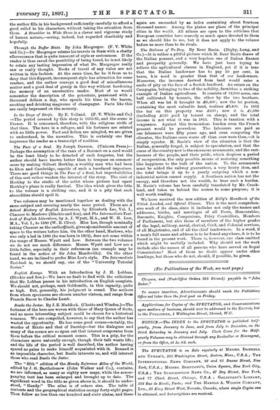The Italians of To - Day. By Rene Bazin. (Digby, Long, and
Co.)—It is rather a pitiful picture which M. Rene Bazin draws of the Italian peasant, and a very hopeless one of Italian finance and prosperity generally. We have just been trying to relieve the agricultural classes in England, yet if it is true that the Italian landowner has to pay 30 per cent. in taxes, his need is greater than that of our landowners. Moreover, the incomes derived from land would raise a smile of pity on the face of a Scotch landlord. An estate on the Campagna, belonging to two of the nobility, furnishes a striking example of Italian agriculture. It consists of 13,900 acres, one half cultivated by tenants, the other by the two brothers. When all was let it brought in 46,400; now the let portion, containing the most valuable land, realises 43,400. In 1855 the tax on this property was 4400 ; now it is 41,680 (including 4120 paid by tenant on sheep), and the total income is not what it was in 1855. This is taxation with a vengeance. Against this tremendous burden even the French peasant would be powerless. The labourers are paid as our labourers were fifty years ago, and even comparing the climates, the Italians seem worse off than ours were then,—it is simply squalor. M. Bazin's view of the situation is that the Italian, generally frugal, is subject to speculation, and that the curse of the country now is the enormous armaments, and the rest- lessness of the people, and their pride, which despises a period of recuperation, the only possible means of restoring something like happiness to the bulk of the nation. To the armaments must be added the railway guarantees, a very heavy item, and the total brings it up to a yearly outgoing which a non- industrial nation cannot supply. A Southern nation has not the energy, and therefore not the wealth, to bear such a burden. M. Bazin's volume has been carefully translated by Mr. Crook- land, and takes us behind the scenes to some purpose; it is well worth reading.
We have received the new edition of Kelly's Handbook of the Titled, Landed, and Official Classes. This is the most comprehen- sive work of its class, since it includes not only the names and addresses, births, and marriages of all Peers, Honourables, Baronets, Knights, Companions, Privy Councillors, Members of Parliament, but also those of members of the higher grades of the legal, military, naval, clerical, Civil, and Colonial services, of all Magistrates, and of all the chief landowners. In a word, if a man's full name and address is to be found anywhere, it is to be found in the present work. There is, however, one class omitted which might be usefully included. Why should not the work include also the names of all persons who have served on Royal Commissions ? Most of them no doubt appear under other headings, but those who do not, should, if possible, be given.
(For Publications of the Week, see next page.)


































 Previous page
Previous page